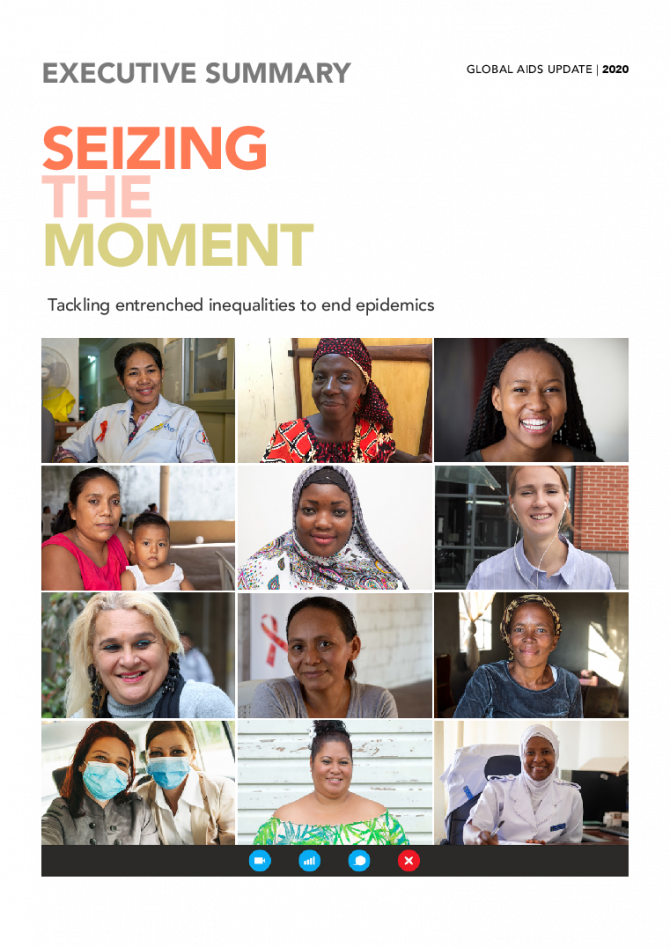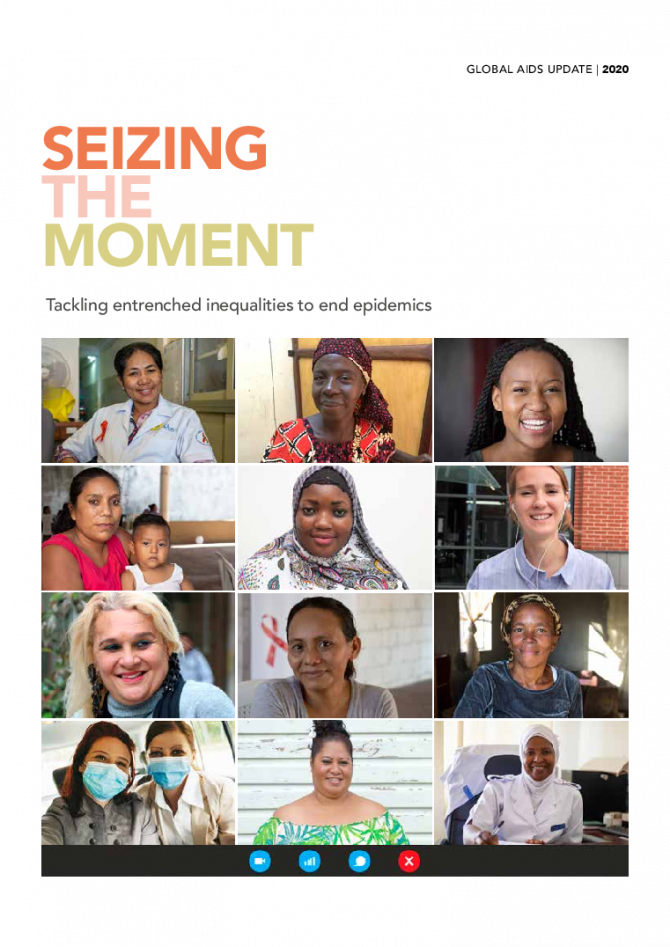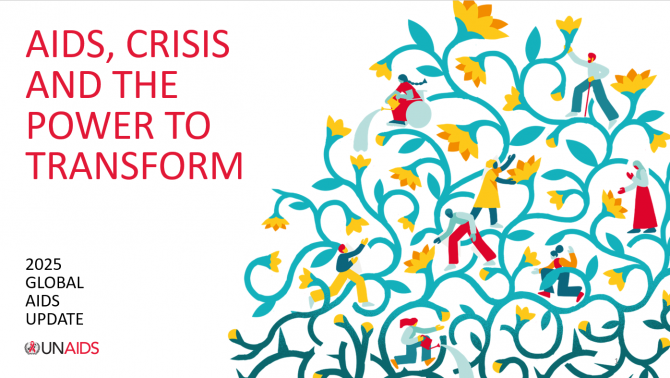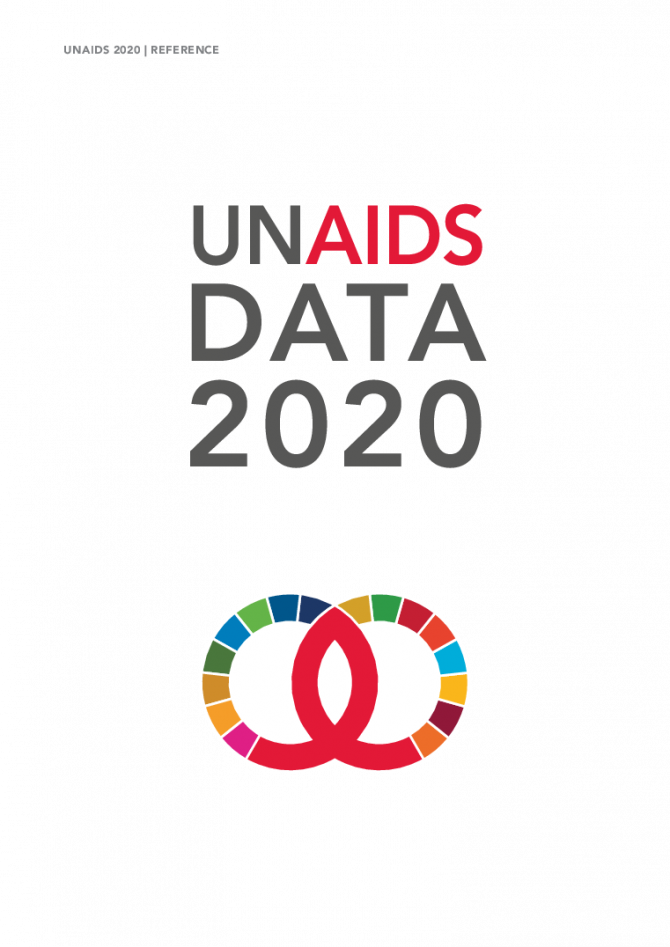Documents
Executive summary — 2020 Global AIDS Update — Seizing the moment — Tackling entrenched inequalities to end epidemics
07 July 2020
Documents
2020 Global AIDS Update — Seizing the moment — Tackling entrenched inequalities to end epidemics
06 July 2020
UNAIDS report on the global AIDS epidemic shows that 2020 targets will not be met because of deeply unequal success; COVID-19 risks blowing HIV progress way off course. Missed targets have resulted in 3.5 million more HIV infections and 820 000 more AIDS-related deaths since 2015 than if the world was on track to meet the 2020 targets. In addition, the response could be set back further, by 10 years or more, if the COVID-19 pandemic results in severe disruptions to HIV services.
Visit the special page to read this report interactively and access all related materials
Documents
UNAIDS data 2020
06 July 2020

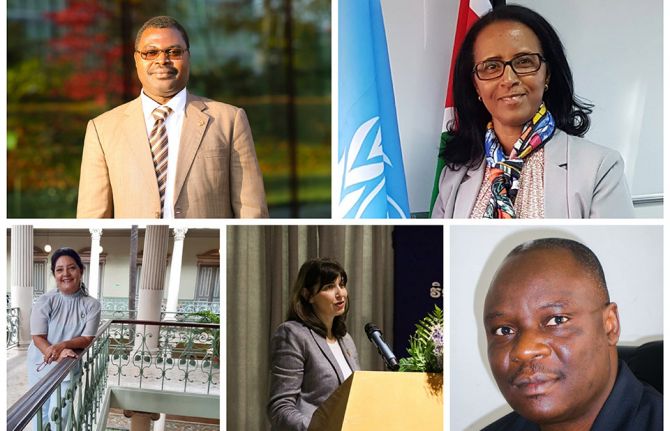
Feature Story
Five UNAIDS country directors taking the lead in the COVID-19 response
11 June 2020
11 June 2020 11 June 2020The experience of the UNAIDS Country Director for El Salvador, Celina Miranda, a trained medical doctor, has been very useful during the COVID-19 outbreak. When the United Nations Resident Coordinator nominated her to be the COVID-19 response team leader within the United Nations in the country, she was honoured.
“I accepted the challenge, since the experience of working at UNAIDS on HIV has given me the skills needed to handle these types of situations,” she said.
To date, she has handled six confirmed COVID-19 cases of United Nations personnel from different agencies. “Some went to hospital, while others self-quarantined, and all are already emerging from the acute stage,” Ms Miranda said.
A main task for COVID-19 coordinators is to determine whether local hospitals could admit and treat United Nations personnel and their dependents. El Salvador was not ready for the pandemic, she said, which added to the pressure.
Ms Miranda, along with four other UNAIDS country directors, has been nominated by the United Nations Country Teams as COVID-19 coordinators in their respective countries.
Vladanka Andreeva in Cambodia, Yafflo Ouattara in Chad, Job Sagbohan in Burkina Faso and Medhin Tsehaiu in Kenya have all felt honoured to take on such a responsibility.
Ms Andreeva explained how in early March the United Nations in Cambodia set up a United Nations Internal COVID-19 Preparedness and Response Team, and she was asked to lead the efforts in ensuring that more than 2500 United Nations staff and their dependents have access to the latest COVID-19 information, treatment, care and support. She developed a contingency plan for the United Nations family and supported the establishment of a medical evacuations process and mental health support services for staff.
Mr Sagbohan, a trained medical epidemiologist who has worked for the World Health Organization during Ebola and yellow fever outbreaks, said he spent a lot of time reassuring employees in order to overcome stress and fear. “Staff were scared, so during the lockdown period I got up to 300 calls a week despite the regular virtual town hall briefings for staff across Burkina Faso.”
He explained that despite UNAIDS’ size and lack of resources compared to other agencies, knowing about infectious diseases has helped greatly. He quickly requested focal points from different organizations and set up a United Nations taskforce against COVID-19. “I have been able to tap into a solid group of motivated people to help me and it has made all the difference.”
For Yafflo Ouattara, the COVID-19 coordinator role suits UNAIDS country directors perfectly. “We are used to getting buy-in from our Cosponsors, so joint teamwork is part of our DNA,” he said. His main task in Chad has been expanding intensive care units and setting up a strong referral system for the management of severe cases. Nearly 7000 United Nations employees and dependents are spread out across the country, some in places where there is no overnight care.
Like others, he also helped out with the national COVID-19 contingency plan to ensure that people living with HIV have access to treatment and care.
He said that the pandemic highlighted gaping holes in the country’s health system. “Not only were key investments in intensive care never made, some of the basics, like gloves, masks, soap, have been missing all along.”
Living in a COVID-19 world means a lot of readjustments. “We have an opportunity to step in and make our voices heard to overhaul systems,” Mr Ouattara said.
Medhin Tsehaiu agrees. She has been proud to see UNAIDS be part of the greater discussion.
“We are present and we are very actively and willingly doing our share,” she said. But she believes that COVID-19 has forever changed how people work.
All the virtual meetings and no travel has meant that people were much more available, so there was non-stop communication, but it was very time-consuming, she explained. “The crisis brought us together, whether we like it or not, and that has required a lot of collaboration,” Ms Tsehaiu said.
Aside from her long list of tasks as a COVID-19 coordinator, she and a few others started the United Nations Kenya solidarity fund. After much back and forth, they opened a bank account where staff can choose to contribute money during a three-month period that will be dispatched to people in need.
“It’s a way for employees to show empathy and support to the Kenyan people during these difficult times,” she said.
Speaking of solidarity, Ms Andreeva said that the pandemic really tested United Nations reform at the country level, not just in terms of responding to the pandemic but also regarding duty-of-care issues. According to a survey in May, 90% of the staff in Cambodia said that the United Nations leadership at the country level is making the right decisions managing the crisis.
During a virtual town hall meeting of 300 United Nations staff members in El Salvador recently, there was also positive feedback. Ms Miranda said she doesn’t ask for accolades or additional thanks. “I just enjoy helping people and seeing them recover, living their lives fully.”
Our work
Related

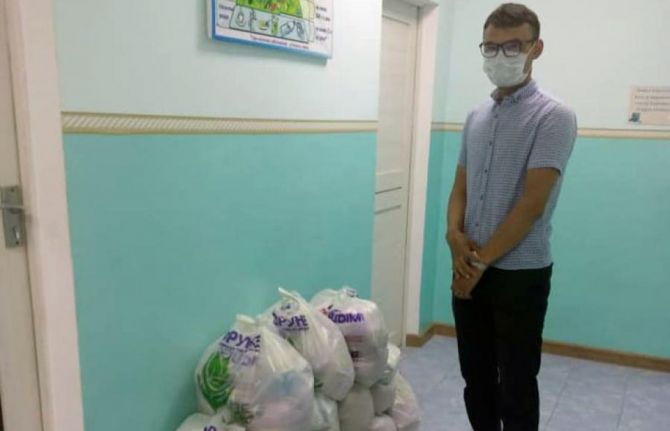
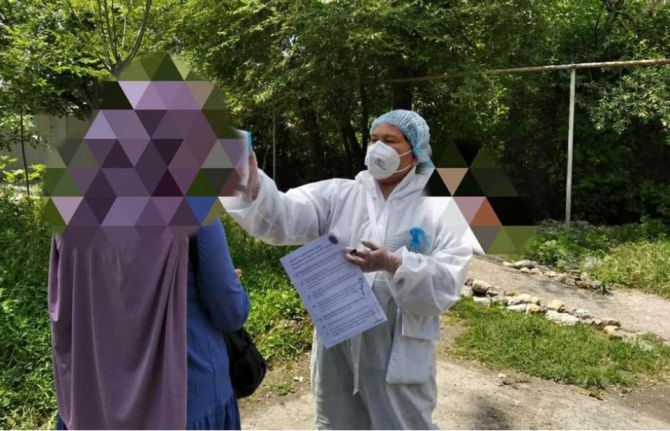
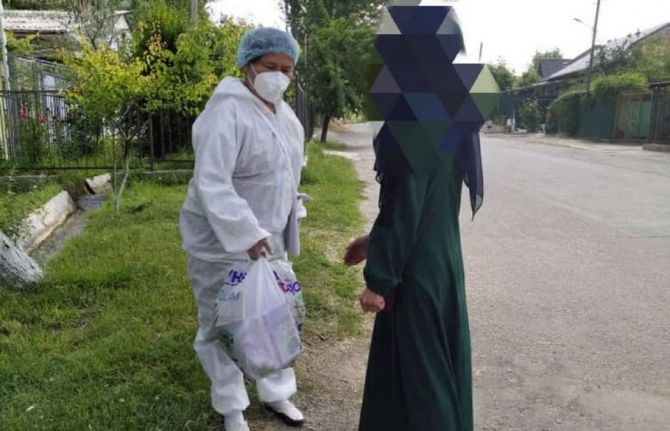
Feature Story
Peer consultants helping the AIDS response in Kyrgyzstan
10 June 2020
10 June 2020 10 June 2020When the son of Kymbat Toktonalieva (not her real name) was finally diagnosed with HIV after numerous visits to the hospital over many months, it was only the beginning of the fight.
Her husband left her, leaving her to look after their child on her own. She fought for her son and his rights, for justice. She went to court, attended rallies, wrote letters, worked with other like-minded people and helped other women in the same situation.
For the past six years, Ms Toktonalieva has channelled that campaigning zeal into working as a peer consultant in a multidisciplinary team in a family medical centre in Osh, Kyrgyzstan, helping people living with HIV to get services, providing support and motivating them to adhere to their HIV treatment. There are 10 multidisciplinary HIV teams in the country, which were formed by UNAIDS in 2013; they all include a specialist in infectious diseases or a family doctor, a nurse and peer consultants.
The peer consultants come from the same environments and backgrounds as the people who they work with and have faced similar problems. They may be people who are living with HIV or people who have been affected by HIV. They have decided to act, helping themselves and others, often serving as a bridge between the medical workers and people living with HIV.
“Working as a peer consultant has given me an opportunity to help people to overcome their problems, many of which I have come across myself in the past,” said Ms Toktonalieva.
The peer consultants work with the medical staff, directing, prompting, helping, talking and listening. They are trained to be non-judgemental and help people who have recently been diagnosed as HIV-positive to accept their status and to learn to live with the virus.
The role of the peer consultants is being expanded by the COVID-19 pandemic. From the very beginning of the pandemic they were in contact with people living with HIV, delivering medicine to people’s homes so they could stay on treatment during the lockdown, distributing food packages and providing psychological support.
Another peer consultant, Kalmurza Asamidinov, who works in Kyzyl-Kiya, said, “My work brings good, but I can’t say that everything works out perfectly. We work with different people. Some need to be persuaded to adhere to their HIV treatment because they don’t believe in the treatment, while others are tired of taking antiretroviral therapy—we have to find a different approach for everyone. People are increasingly in need of simple human communication. Many clients miss mutual help and the support groups, which we cannot provide during the COVID-19 lockdown.”
The peer consultants working in the 10 multidisciplinary teams each have a different story to tell. Mannap Absamov, one of the peers in the multidisciplinary team in Osh, said, “Initially it was difficult. We were not able to understand the medical staff, and they could not understand us. But slowly we found points of contact. The main thing is that almost simultaneously, both on our side and the doctors’ side, there became a clear understanding that we all have one goal. It is important that their patient and our client go to the medical facility and start getting treatment.”
Both during COVID-19 and after, one thing is certain—peer consultants will continue to play a vital role in bringing HIV services to people living with HIV in Kyrgyzstan.

